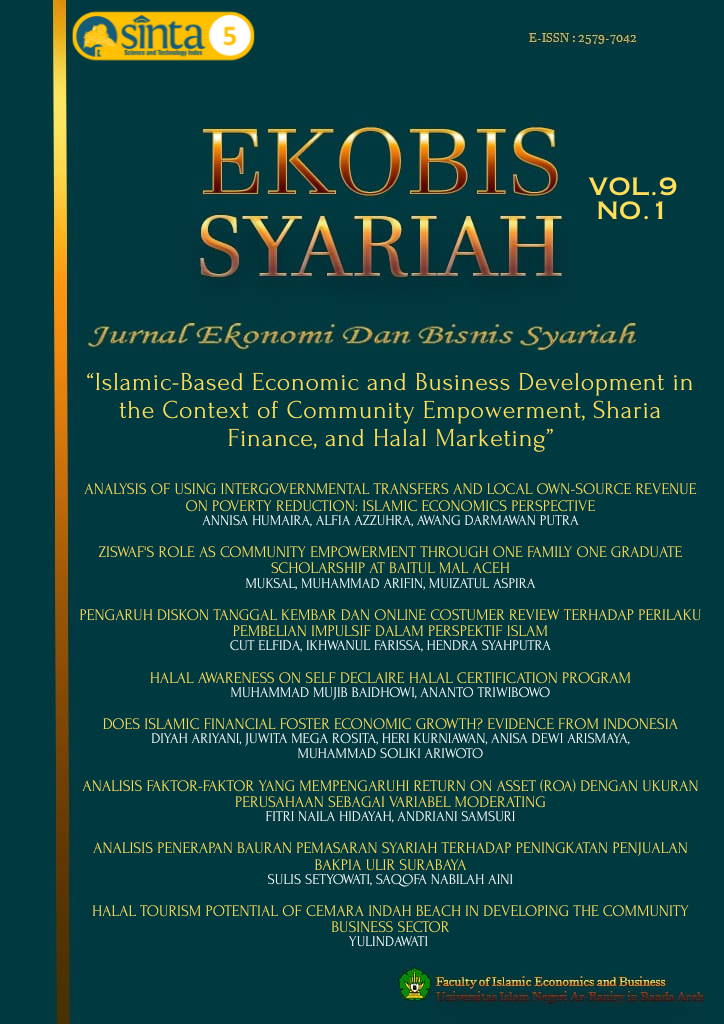ZISWAF'S Role as Community Empowerment Through One Family One Graduate Scholarship at Baitul Mal Aceh
DOI:
https://doi.org/10.22373/s234j714Keywords:
ZISWAF, Optimization, Scholarships, Community Empowerment, Baitul Mal AcehAbstract
Community empowerment through the One Family One Bachelor (SKSS) scholarship is a program that has the potential to develop society both economically, personally and socially. Therefore, this research examines community empowerment and its mechanisms and optimization. The purpose of this research is to determine the mechanism and optimization of community empowerment through SKSS scholarships at Baitul Mal Aceh. This research uses qualitative research methods with a field research approach. The research results show that the mechanism for community empowerment through the SKSS scholarship includes the objectives of the stages and the benefits obtained, where this mechanism is still not well realized. So the optimization of community empowerment through SKSS scholarships is seen from three dimensions of optimization, namely efficiency, effectiveness and economics, which are described by several indicators, which are still classified as less than optimal, because of the many obstacles and obstacles faced and the output that has not been achieved. However, on the other hand, Baitul Mal Aceh is currently trying to carry out an evaluation, designing a new, better system which is expected to optimize community empowerment through SKSS scholarships in the future.References
Abdul Al-Hamid Mahmud, Ekonomi Zakat : Sebuah Kajian Moneter Dan Keuangan Syari’ah(Jakarta, PT. Raja Grafindo Persada, 2006).
Asep Jaenudin, 2011. ”Zakat Untuk Pemberdayaan Pendidikan (Studi Kasus Lembaga Amil Zakat Post Keadilan Peduli Umat Pusat) Skripsi SI Fakultas Syariah dan Hukum, Universitas Islam Negeri Syarif Hidayatullah Jakarta (diakses pada tanggal 10 september 2019).
Aulia, Teuku Reza (2019). Peran Baitul Mal terhadap Pengembangan zakat Produktif dan dampaknya pada pendapatan usaha mustahik (studi kasus pada Baitul mal aceh). Skripsi Publikasi. Banda Aceh:Universitas Islam Negeri Ar-raniry.
Baitulmalaceh (2022). Baitul Mal Aceh. Diambil pada Oktober 2022, dari https://baitulmal.acehprov.go.id tentang Baitul Mal Aceh.
Bastian, Indra (2006). Akuntansi Sektor publik di Indonesia. Yogyakarta : BPFE.
Edi Suandi Hamid, Hendri Anto, Ekonomi Indonesia Memasuki Millennial III, Yogyakarta : UII Press, 2000, Hal.1.
Emzir. (2016). Metodologi Penelitian Kualitatif: Analisis Data. Cet-ke-5. Jakarta: PT. Rajagrafindo Persada.
H. Sudarsono, Bank Dan Lembaga Keuangan Syariah Deskripsi Dan Ilustrasi, (Yogyakarta: Ekonesia FE UII, 2013), Hal 268.
Hadijah, 2016. (Upaya Mahasiswa Penerima Beasiswa Bidikmisi Dalam Meningkatkan Prestasi) Banda Aceh : Universitas Islam Negeri Ar-Raniry Banda Aceh (diakses pada tanggal 10 september 2019).
Haris AlAmin. 2015. penegelolaan zakat konsumtif dan zakat produktif. Vol.14 No.2 Lhokseumwe.
Hasby Asy Shidieqy, Falsafah Hukum Islam (Semarang: Pustaka Rizki Putra, 2001) Sulistiati, Isu-Isu Tematik Pembangunan Sosial: Konsepsi Dan Strategi (Jakarta: Balai Latihan Dan Pengembangan Sosial Depsoso RI, 2004).
Karistiyanti, (Peningkatan Prestasi Belajar Mahasiswa yang Mendapatkan Beasiswa Bidikmisi pada Mahasiswa FKIP Universitas Syiah Kuala). Skripsi, Banda Aceh: Fakultas Keguruan dan Ilmu Pendidikan Universitas Syiah Kuala (diakses pada tanggal 10 september 2019).
Moleong Lexy J. (2021). Metodologi Penelitian Kualitatif. Edisi Revisi. Cet ke-40. Bandung: PT. Remaja Rosdakarya.
Muhammad Bukhori, 2011(” Efektifitas Penyaluran Dana Beasiswa Etos Di Dompet Dhuafa Republika,”) Skripsi SI Fakultas Ilmu Dakwah dan Komunikasi, Universitas Islam Negeri Syarif Hidayatullah Jakarta (diakses pada tanggal 10 september 2019).
Nadia Wulandari, dkk. (2020). Pemberdayaan Masyarakat Di Masa Pandemi Covid-19 pada Ikatan Remaja Masjid Rt.04 Loa Kulu. Kumawula, Vol. 3, No.3, Desember.
Pratiwi, Nursandia, “Analisis Pengukuran kinerja Value For Money pada Badan pengelola keuangan dan asset daerah Kabupaten Blitar.” Program pendikan vokasi Universitas Brawijaya (2017).
Ramadhen Dewi Respaningrum, 2012. (“Manajamen Pendayagunaan Zakat, Infak dan Shadaqah Melalui Program Beasiswa Mandiri (Studi Kasus Lembaga Amil Zakat Nasional Dompet Peduli Umat Daarut Tauhid Semarang Tahun 2012),”) Fakultas Dakwah, Institut Agama Islam Negeri Walisongo Semarang.
Rosyadi, Model Prediksi Kepatuhan Menunaikan Zakat Maal, (Sumut: Mentari Press, 2003).
Saifudin, 2012. Zuhri, (Zakat di Era Reformasi (Tata Kelola Baru), Semarang: Fakultas Tarbiyah IAIN Walisongo.
Sugiyono. (2017). Metodologi Penelitian Kombinasi (Mixed Methods). Cet-9. Bandung: CV. Alvabeta.
Sugiyono. (2013). Metode penelitian pendidikan pendekatan kualitatif, Kuantitatif dan R&d. Bandung: alfabeta.
Tangkilisan, Hessel Nogi. (2007). Manajemen Publik. Jakarta: Grasindo.
Wahiji, Karamoy, Kapojos, “Analisis pengukuran kinerja instansi pemerintah dengan menggunakan pendekatan Value for money pada Badan Narkotika Nasional Provinsi Gorontalo.” Jurnal LPPM Bidang Ekasosbudkum,vol 6, no 1,(2022):335-344.
Downloads
Published
Issue
Section
License
Copyright (c) 2025 Muksal Muksal, Muhammad Arifin, Muizatul Aspira

This work is licensed under a Creative Commons Attribution-ShareAlike 4.0 International License.
EKOBIS allows the author(s) to hold the copyright and to retain the publishing rights without restrictions. Authors who publish with this journal agree to the following terms:
- Authors retain copyright and grant the journal right of first publication with the work simultaneously licensed under a Creative Commons Attribution License (CC-BY-SA 4.0) that allows others to EKOBIS the work with an acknowledgment of the work's authorship and initial publication in this journal.
- Authors are able to enter into separate, additional contractual arrangements for the non-exclusive distribution of the journal's published version of the work (e.g., post it to an institutional repository or publish it in a book), with an acknowledgment of its initial publication in this journal.
- Authors are permitted and encouraged to post their work online (e.g., in institutional repositories or on their website) prior to and during the submission process, as it can lead to productive exchanges, as well as earlier and greater citation of published work

